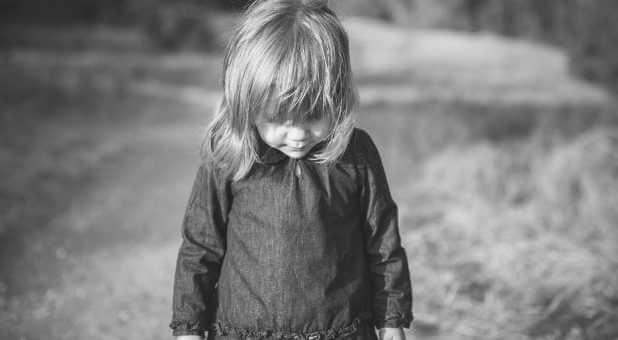Children waved gleefully, poking their heads out of their bedroom windows to greet us as our red van pulled down the muddy driveway.
My heart flipped, and tears came to my eyes when I saw the explosive smile of one brown-skinned gypsy boy, so excited to welcome the strangers. I looked over at my husband, who had let out a grieved sigh. “Oh man …” he breathed out heavily, his eyes brimming with tears.
A light rain was falling as we stepped out of our van. We stood out in the drizzle, shaking hands with the orphanage worker who came to meet us.
The place felt desolate.
My heart reeled at the utter emptiness that brooded over the atmosphere of the place.
I walked toward a door at the back of the building as the orphanage director beside me led the way.
“How often do people visit these children?” I asked her.
“Just at Christmas time, usually, and sometimes other holidays. Maybe Easter,” she told me.
We were the unusual September visitors. It had been months since strangers had stepped into their worlds, and they were eager to receive us.
We came with a trunk-load of school supplies for the 47 children who lived within those orphanage walls. But more so, we came with hearts wanting to be broken again for forgotten children whom many do not see and most will never meet.
That day, I looked with the Father, whose eyes had ever been looking, who knew each of the stories living inside of that building. He and I saw together.
I stepped into a building with 47 orphan stories inside. We walked through the hallways, offering our greetings to each room of boys and girls we passed.
We met the shy ones, the squirmy ones, the excited ones and the cool ones. From age 4 all the way to 18, they came. One of the really short ones, the youngest of the whole bunch, shuffled over to my husband and offered his small hand to shake. Jon squatted down to 4-year-old height.
Word by word, the little boy repeated what the translator whispered in his ear. His choppy sentence was executed with a brilliantly thick accent. “Hello. My. Name. Is. Jon.”
Big Jon smiled at little Jon. “Hey! That’s my, name too!” They had their special moment. (Because it’s not every day a tiny orphaned gypsy boy meets a tall white American who shares his name.)
More children came to offer their hellos and to give affection-starved hugs. My eyes scanned the room for a few moments, watching some kids make their blue yarn bracelets, others playing “Simon Says” and still others chatting away with the visitors who’d come to listen.
These are some of the most important people in the world. The thought pressed into my heart. These who have taken the lowest place in society are the ones to whom God, Father to the fatherless, has joined His name.
Still, as important as they are, they are only visited once or twice a year.
No matter what nation they live in, the orphaned everywhere consider themselves to be the forgotten ones, the rejected ones, the unwanted ones.
Visitors maybe come by to be a blessing on the holidays. But what about the other days?
I know a man who grew up within the foster system who now looks back at his childhood Christmases and feels a sting. He of course loved the presents that were delivered to his group home. But the holidays would inevitably pass, and life would go on as before—with new toys but no one to sow into his greater need. His heart hemorrhaged with aches of loneliness, rejection and despair.
Though gifts were delivered, there was rarely a face or a heart that decided to stay beyond the holiday.
But it is consistent presence that holds the power to unlock, to heal, to express deep love.
The orphaned need presence.
And really, we all do.
We need eye-to-eye, face-to-face, hand-in-hand, heart-to-heart—we need that which can minister to our heart-throbbing, God-infused desire:
To know love.
It’s our freedom, our healing, our destiny.
Christ has loved us, not from a distance. No, He came up close, got into the dust with us. He shattered high walls, broke chains, shined His light into dark places.
His nearness—His words spoken, His embraces given, His willingness to sweat and bleed and embrace weariness for us—gave us life and let us trade hopelessness for hope.
So yes, let’s certainly give with generous hearts to the forgotten ones on the holidays. But what if we stuck around a little longer than a day or two, got into the dust with them and loved up close? {eoa}
Kinsey Thurlow is a minister at the International House of Prayer in Kansas City. She is an advocate for the fatherless and her husband, Jon is a worship leader and minister at IHOP-KC.











































